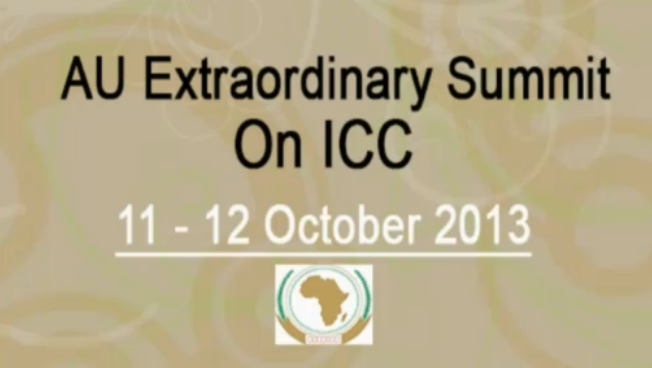 On October 11 and 12, the African Union held an Extraordinary Summit on the International Criminal Court (ICC) in Addis Ababa, Ethiopia to discuss concerns regarding the ICC’s treatment of African cases and the upcoming trial of Kenyan President, Uhuru Kenyatta. [AU]
On October 11 and 12, the African Union held an Extraordinary Summit on the International Criminal Court (ICC) in Addis Ababa, Ethiopia to discuss concerns regarding the ICC’s treatment of African cases and the upcoming trial of Kenyan President, Uhuru Kenyatta. [AU]
Prior to the meeting, the international community feared that Member States of the AU would vote to withdraw from the ICC due to increasing tension in the relationship between the international court and African States. Though the Assembly chose to pursue less drastic measures, members of the Assembly expressed their dissatisfaction with what they perceive as the ICC’s targeting of African nations. [BBC; CNN] The assembled government representatives also highlighted the fact that the AU is looking to expand the mandate of the future, potential African Court of Justice and Human Rights so that it may prosecute individuals for international crimes such as genocide, crimes against humanity and war crimes. [AU] Currently, all of the ICC’s open cases arise from events that occurred in African countries including Mali, Sudan and Kenya. [ICC]
Mr. Kenyatta faces charges of crimes against humanity including rape, murder, persecution, and other inhumane acts for his alleged role in post-election violence in 2007. [ICC; CNN] His trial is scheduled to begin on November 12, 2013. [ICC] The AU plans to request a deferment from the UN Security Council and, if that fails, to then seek a postponement of the trial. Article 16 of the Rome Statute allows for a deferment of one year with subsequent extensions pursuant to a Security Council resolution made under Chapter VII of the UN Charter, pertaining to the maintenance of international peace and security.
Should the trial move forward as scheduled, the AU has decided that Mr. Kenyatta should not appear. Although Mr. Kenyatta and fellow Kenyan defendant, Deputy President William Ruto, have said they will cooperate in the proceedings, they would prefer to be excused from continuous presence in The Hague or, alternatively, a postponement by the Security Council in order to focus their attention on domestic security concerns. [AFP] Article 58 of the Rome Statute allows the ICC to issue an arrest warrant to ensure defendants’ appearance in court.
In response to the ICC cases against Kenyatta and Sudanese President Omar Hassan al Bashir, the Assembly agreed to pass a resolution that no sitting head of State would ever appear before the ICC. [BBC] They justified their decision as necessary to “safeguard the constitutional order, stability and integrity of member states.” [AU] The AU rejected suggestions that their actions undermined their commitment to combat impunity and support human rights. [AU] In support of their decision, the Assembly noted that principles of both international and national law grant immunity to government officials during their term in office and observed that no sitting head of State has ever been tried before an international court. [AU]
Many international human rights organizations have criticized the outcomes of the AU extraordinary session. According to Human Rights Watch, granting sitting heads of State immunity creates an incentive for “the unscrupulous to gain or maintain power at whatever cost—by murder, coup, or fraudulent elections.” Additionally, Amnesty International asserted that hindering the ICC prosecutions would only delay or prevent justice for the victims of the violence in Kenya and other situations under investigation by the ICC.
The ICC, formed in 2002, is governed by the Rome Statute. It prosecutes persons accused of the most serious international crimes including genocide, war crimes and crimes against humanity. The ICC operates independently from the United Nations and other international bodies. [ICC] African States constitute 34 of the ICC’s 122 members. [ICC] Should the African nations ever move towards withdrawal from the Rome Statute, the effect on the ICC would be significant.
